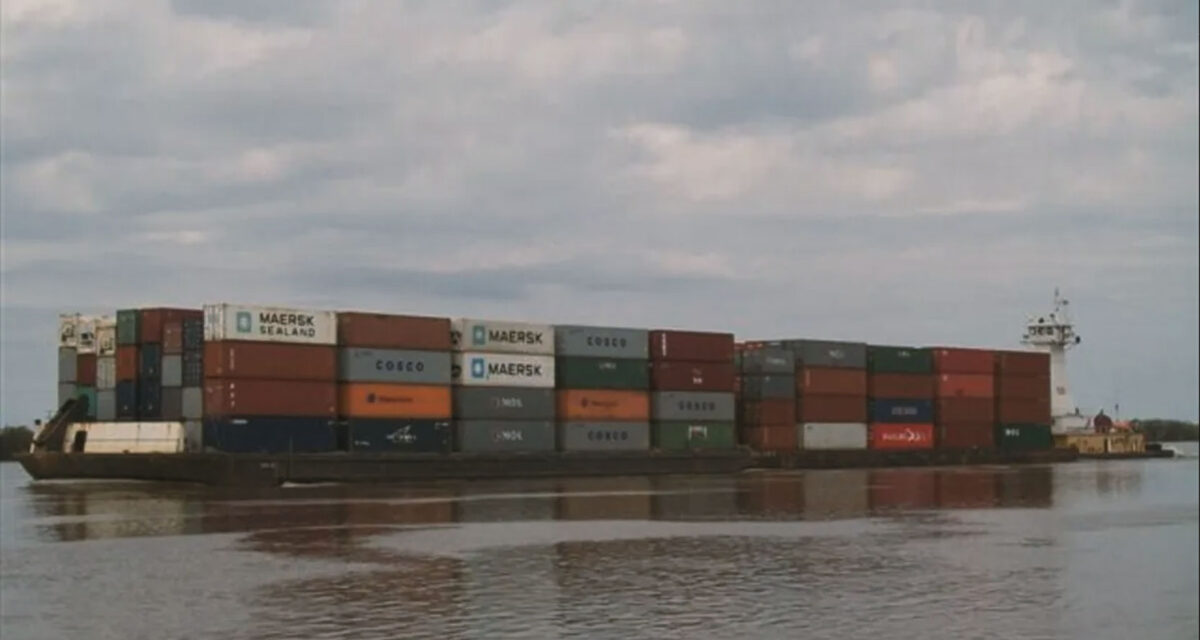Circular
Servirio`s News
THE PARANÁ WATERWAY WILL BE CONTROLLED BY THE NATIONAL CONGRESS

The project to do so will be debated in the Senate compound at the next meeting
L The navigable path of the Paraná River, which for 25 years private interests managed to rename it Hidrovía (by the company of the same name that controls it commercially), has fully entered the political and economic debate in Argentina to come. On April 30, the concession of the multinational company that has operated it since 1995 (Hidrovía SA) expires and the controversy about what to do in the future runs through the ruling political front. To return to concession it to the multinational private sector, or to place the State in a decisive role in controlling the most important “toll” in the country? The one paid by the giant freighters that navigate the waters of the Brown River.
For now, the national Senate, with a pro-government and Christian majority, hastens the formation -through a law, on Thursday an opinion was issued- of a Bicameral Commission “for Monitoring, Control of the Bidding and Operation of the Paraguay-Paraná Waterway and the System of Trunk Navigation with jurisdiction in the Argentine Republic “
The law for the creation of the new Bicameral, with broad powers, will go to the campus next week – if the session is confirmed. Among its faculties, “it will have as its objective the study, knowledge, follow-up, monitoring, audit and control of the bidding process of the Paraguay-Paraná Waterway, of the Trunk Navigation System, of the investments necessary for the integral development of the regions and all those related issue related to transportation, integration, economic growth and productive development ”. Once the half-sanction is obtained in the Senate, it will pass to Deputies and only then will it be conformed, with twelve members, six from each of one of the chambers.
“The impulse of the creation is agreed with the Deputies,” Senator María de los Angeles Sacnun told the Capital, seeking to clear the ghosts that could lurk about some other half sanctions that the Senate hurried, and that passed when sleeping of the just in the lower house: the most shocking example, the half-sanction to create a bicameral commission to study and investigate the Vicentin case. Deputies never completed that half-sanction, and Vicentin weighs, to this day, as a painful political defeat for the Casa Rosada.
Sacnun, factotum of the new bicameral and the only one of the three senators of the province of Santa Fe who promoted and participated in the debate, chaired the plenary of the Commissions on Constitutional Affairs – she is the incumbent – and on Budget, from where she took It forms the opinion of three pages and eight articles, and got all the members present – ruling party and opposition – to sign: unanimously.
“The bicameral brings Congress into control so that it is not only in the hands of the Executive,” explained the native leader of Firmat to this chronicler.
If the law is approved and the bicameral is constituted, the new dozen national legislators will be able to shine a light on a world dominated by opacity and proven evasion, they will be able to:
request all kinds of documentation and information related to the Waterway and the Trunk Navigation System, both from the private and public sectors, and from local and international organizations.
Summon national, provincial, municipal and community officials to provide reports and representatives of the agencies that manage, control, execute and develop the Hidrovía tender.
Require reports from Universities, business, industrial, commercial, agricultural production and workers entities.
Prepare reports providing concrete proposals and advising on the progress of the proposed actions, with special emphasis on the harmonious development of the nation, respect for federalism, the development of regional economies and care for the environment.
Audit the investments, costs and expenses that arise from the bidding of the Hidrovía.
In addition to the final decision made by the president of the nation, in the sense of whether the so-called waterway will have state control, or will continue as a concession to private parties, doubts remain about who will be in charge of managing and collecting the toll of the fabulous “highway” of the river from next May 1 – the current concession has ended. From the ruling party in the Senate, they suggest a “transitional” process, where the current multinational does not maintain control of that box close to 190 million dollars per year. Others speak of “extending” the concession until the new tender is held, a procedure that would take at least one semester.
The discussion about who controls and exploits the use of the navigable path of the Paraná River is not only a debate about “dredging and beaconing, but we are also discussing a national project, the control of foreign trade, the goods that enter and leave the country Through the Paraná River, the crimes that are committed there: economic crime, smuggling, tax evasion, human trafficking and drug trafficking”, María de los Ángeles Sacnun explained to LaCapital.
Different economic studies assure that the “flight” of foreign exchange through the river would be considerable. Among others, one carried out by the United Nations in 2017, according to which Argentina loses 4 percent of its GDP per year due to lack of controls on the cargoes of ships, 21 billion dollars.
“If we do not look at the control of this foreign trade, on the fact that transnational companies do not evade the resources that Argentina requires to get ahead, it would be a political mistake. Argentina is among the five countries in the world most affected by the loss of tax revenues at the hands of transnational companies,” Sacnun added.


